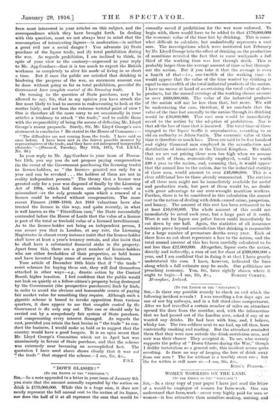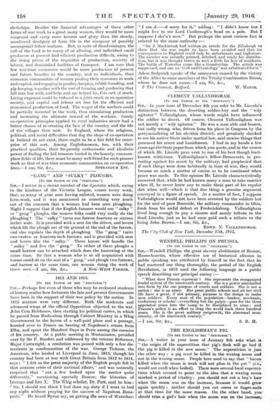WOMEN WORKERS ON THE LAND.
[To THE EDITOR op' Tar."SPECTATOR."[ . .
SIR, —In a stray copy of your paper I have just read the letter of a would-be employer of women for farm-work. One can understand that farinzwork--never very highly paid for man or woman—is less attractive than munition-making, nursing, and. clerkships. Besides the financial advantages of these other forms of war work to a great many women, they would be more congenial and carry more honour and glory than the steady, unrelieved drudgery of farm life in the company of possibly uncongenial fellow-workers. But, in spite of disadvantages, the call of the land is to many of us alluring, and individual small producers at present find efficient production difficult, owing to the rising prices of the requisites of production, scarcity of labour, and diminished facilities of transport. I am sure that few war-time economies would be more productive of present and future benefits to the country, and to individuals, than economic communities of women pooling their resources in work and capital, and engaging in poultry-keeping, rabbit-breeding, and pig-keeping, together with the sort of farming and gardening that fall into line with, and help, and are helped by, this sort of stock. Living expenses could be reduced in a joint-stock or co-operative society, and capital and labour set free for the efficient and economical production of food. The wages of the workers could be partially invested in the work, thus stimulating production and increasing the ultimate reward of the workers. Surely co-operative principles applied to rural industries never had a better chance of re-creating the face of the country and the life of the villages than now. In England, where the religious, political, and social difficulties that dog the steps of co-operation in Ireland do not exist, there ought to be a fair field for enter- prise of this sort. Among Englishwomen, too, with their practical qualities, their frequently enthusiastic and idealistic power of finding the hid treasure buried in the homely, common- place fields of life, there must be many well fitted for such pioneer work as that of war-time economic communities on co-operative



















































 Previous page
Previous page